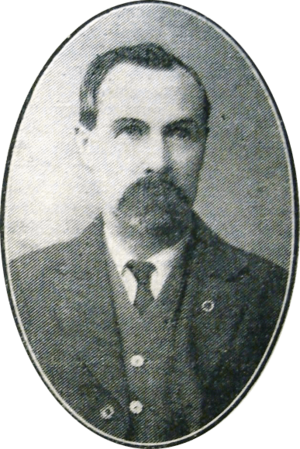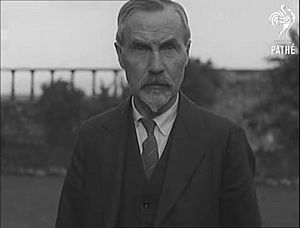Domhnall Ua Buachalla facts for kids
Quick facts for kids
Domhnall Ua Buachalla
|
|
|---|---|

Domhnall Ua Buachalla c. 1916
|
|
| 3rd Governor-General of the Irish Free State | |
| In office 27 November 1932 – 11 December 1936 |
|
| Monarch | |
| Preceded by | James McNeill |
| Succeeded by | Office abolished |
| Teachta Dála | |
| In office June 1927 – February 1932 |
|
| Constituency | Kildare |
| In office May 1921 – June 1922 |
|
| Constituency | Kildare–Wicklow |
| In office December 1918 – May 1921 |
|
| Constituency | Kildare North |
| Personal details | |
| Born | 3 February 1866 Maynooth, County Kildare, Ireland |
| Died | 30 October 1963 (aged 97) Dublin, Ireland |
| Spouse |
Sinéad Walsh
(m. 1891; died 1918) |
| Children | 7 |
Domhnall Ua Buachalla (born Daniel Richard Buckley; 1866–1963) was an important Irish politician. He was a strong supporter of the Irish language and played a part in Ireland's fight for independence. He is best known for being the third and last Governor-General of the Irish Free State. This role was like a representative of the British King in Ireland. Later, he also served on the Council of State, which advises the President of Ireland.
Contents
Early Life and Irish Language Fight
Domhnall Ua Buachalla was born in Maynooth, County Kildare, on February 3, 1866. His family ran a shop. He married Sinéad Walsh in 1897, and they had seven children. In Maynooth, he managed a shop that sold groceries, bicycles, and also worked as a pub.
He was very passionate about the Irish language. He was an active member of Conradh na Gaeilge, a group that worked to bring the Irish language back into everyday life. In 1907, he faced trouble because of his love for the language. He refused to pay a fine after painting his grocery wagon with his name in Irish, Domhnall Ua Buachalla. At the time, British law said that grocery wagons had to be registered only in English. His groceries were taken away because of this.
Fighting for Irish Freedom
Ua Buachalla was a member of the Irish Volunteers, a group that wanted Ireland to be independent. When the Easter Rising happened in 1916, he walked 26 kilometers to Dublin to join the fight. After the Rising, he was arrested and imprisoned, but he was released in 1917.
Like many others who survived the Rising, he joined Sinn Féin. This was a political party that wanted Ireland to be a republic, completely separate from Britain. In the 1918 Irish general election, he was elected as a Sinn Féin Member of Parliament (MP). He served in the First Dáil, which was Ireland's first independent parliament. He was re-elected in 1921.
When the Anglo-Irish Treaty was signed, which created the Irish Free State but kept a link to the British Crown, Ua Buachalla sided with Éamon de Valera. They opposed the Treaty because they wanted a fully independent Irish Republic. He fought in the Irish Civil War against the Treaty. He was imprisoned but later released by Anti-Treaty forces.
Becoming Governor-General
In 1926, Ua Buachalla joined Fianna Fáil, a new political party founded by Éamon de Valera. He was elected as a Teachta Dála (TD), which is a member of the Irish Parliament, in 1927. Although he lost his seat in the 1932 election, Fianna Fáil won the election.
After the election, Éamon de Valera chose Domhnall Ua Buachalla to become the Governor-General of the Irish Free State. This was a very important role, acting as the King's representative in Ireland. He took office in November 1932.
A Quiet Role
De Valera wanted the Governor-General's job to be less visible. So, he told Ua Buachalla to keep a very low public profile. This meant Ua Buachalla did not attend many public events. He still carried out important official duties, like approving new laws and calling meetings of the Irish Parliament. However, he avoided public appearances as much as possible.
He only performed one public duty during his time in office: receiving the French Ambassador in 1933. Later, de Valera even moved this duty to his own role as head of the government. Ua Buachalla was rarely mentioned in public. One time was when he replied to messages of sympathy from the US President after King George V died in 1936.
Ua Buachalla also did not live in the official residence for the Governor-General, which is now called Áras an Uachtaráin. Instead, a house was rented for him outside Dublin. He also refused most of his salary, taking only a small part of it.
Leaving Office and Later Life
Ua Buachalla's time as Governor-General ended in December 1936. De Valera used a situation involving the British King, Edward VIII, to change the Irish Constitution. This change got rid of both the King's role in Ireland and the office of Governor-General.
This sudden change caused a problem for Ua Buachalla. He had signed a five-year lease for his rented home, expecting to stay in office for that long. With his job gone, he was left responsible for the remaining year's rent, which he could not afford. Eventually, de Valera had to give Ua Buachalla a large pension and pay his outstanding rent. This prevented a potentially embarrassing court case.
Despite this disagreement, Ua Buachalla and de Valera became political partners again. In 1959, when de Valera became President of Ireland, he appointed Ua Buachalla to his advisory Council of State.
Domhnall Ua Buachalla passed away on October 30, 1963, at the age of 97, in Dublin. He received a state funeral and was buried in Laraghbryan Cemetery in Maynooth. President de Valera gave a speech at his graveside.
The hardware store that Ua Buachalla's family ran in Maynooth closed in 2005. A road next to the store is named after him, "Buckley's Lane". The building itself was taken down, but some of its front has been saved and is now part of a building called "Buckley House".
Images for kids



